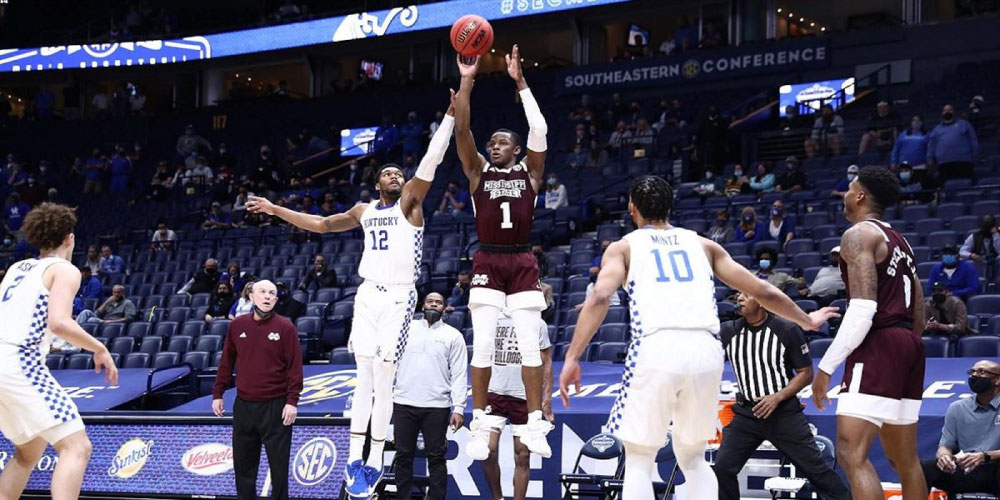
What do Chris Duarte and Iverson Molinar have in common? They both eat patacones and are moving up NBA draft boards with a bullet. Duarte, who was born in the Dominican Republic and plays for the Oregon Ducks, was runner up for POY in the PAC 12 conference. Molinar, who is from Panama City and is currently fourth in the SEC in scoring for Mississippi State Bulldogs, made the game winning free throws to beat the University of Kentucky on Friday. The two athletes are part of a growing cadre of elite basketball players from Latin America.
In 1993, the percentage of Latinos in Major League Baseball was about 16.5%. Today Latino athletes fill 28% of the rosters in MLB. For years, Latin America has produced some of the best soccer and baseball players in the world. Currently, Latino athletes make 57% of the player rosters for Major League Soccer. Athletic talent runs deep south of the border, but pro basketball talent has not made it to the big stage of the NBA until very recently. In the last two decades, NBA rosters have increasingly been filled with international athletes from practically every region in the world, except Latin America. There have been exceptions like Manu Ginóbili and Ed Nájera, but very few. While the talent has always been there, the coaching and resources have not. This is about to change.
Latino athletes are showing up in major college basketball rosters across the country. This is in part because there are more coaches in the college ranks who are giving these athletes a chance, and also because coaches like George Zedan are getting to Latin American basketball players at a younger age. I wrote about Zedan and the prep school he runs in Los Angeles a few months ago when they were featured in Sports Illustrated. While the pandemic has thrown some obstacles, George and his team have continued to build a world-class basketball training platform that is laser-focused on grooming young basketball players from Latin America. Molinar attended Zedan’s Veritas Prep and was one of his first players to play for a high major college. His parents credit Zedan for guiding their son’s athletic progress to an elite level. What Zedan is doing has been long overdue. As quality coaching and high-level facilities work their way down to Mexico, the Islands and Central and South America, Latino hoopers will begin filling the rosters in professional leagues around the world. The intangible quality that Latin athletes possess is the eye-of-the-tiger, the special grit and toughness that Zedan and his assistant coaches have an ability to take to another level. I’ve attended practices at Veritas and I’ve seen it with my own eyes. Basketball is just a game here in the states, but to these kids, it’s a lifesaver.
A player like Molinar, whose nickname in Panama is “El Fenomeno”, can be a tipping point that can open the door for a wave of Latino basketball talent in the NBA. While it may take decades for Latin American athletes to dominate professional basketball the way they’ve dominated baseball and soccer, I predict that 10 percent of the NBA will be Latino in less than ten years. As a fan and former hooper myself, I can’t wait for that to happen. En Fuego!
What if Donald Trump’s greatest strength is something the rest of us refuse to acknowledge? In this thought-provoking episode, Gary Acosta explores what liberals, global leaders, and entrepreneurs might learn from Trump’s approach to leadership. From mastering direct communication to shaping loyalty through perceived authenticity, Gary dives into the mechanics of modern influence—even when the messenger is flawed. Whether you agree or disagree with Trump, the lessons here reveal surprising truths about power, persuasion, and strategy in today’s world.
What do people really mean when they say, “DEI is destroying our country”? In this powerful episode, Gary Acosta takes on the backlash against Diversity, Equity, and Inclusion—and asks whether it’s become a coded way to express racism. He breaks down myths about lowered standards, exposes the hypocrisy behind legacy admissions, and challenges the silence around nepotism and privilege. DEI may be a polarizing term today, but Gary argues that its core values remain essential to capitalism, innovation, and fairness in America’s future.
The Latino brand impacts every aspect of our lives—from how we're viewed in business and media to the opportunities we’re given. In this first episode, Gary Acosta explores why a unified, empowered narrative is essential for Latino prosperity. Learn what Gary shared at the United Nations, how he raised $100M for Latino-led ventures, and why changing the perception of our community is the key to unlocking capital, influence, and success.
